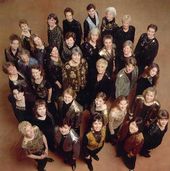 Elektra
Women's Chorus
Elektra
Women's ChorusDirectors Morna Edmundson and Diane Loomer Organ Rupert Lang Piano Stephen Smith
Music by Britten, Taverner, and Kenneth Leighton and others
Choral Connections Series
Date 5 August 2005 at 17.00 Venue Christ Church Cathedral
Reviewer J H Stape
 |
|
Festival Vancouver 2005 |
This hour-long concert of twentieth-century music, ranging from the sublime (Britten's Missa Brevis and Ross Whitney's "Pentatonic Alleluia" ) to the silly (the encore, the Quebec folk song"V'là l'bon vent") was as welcome as a crisp chablis in the dog-day heat and showed off the choir's expressive capacities to the hilt.
Focussed mainly on religious music in its six opening pieces, the programme moved on to an equally secular section (not formally designated as such) for its closing four numbers. Variety of mood and colour was the real keynote of this concert showcasing the choir's talents.
After Benjamin Britten's almost peppy Missa Brevis in D, Op. 63, sung from the organ loft, the choir descended into the cathedral forming a a wide circle behind and around the audience to perform Ross Whitney's "Pentatonic Alleluia." Solo entries in what seemed random order and tempi (chosen by the individual singers) gradually built into a unified voice, growing to mezzaforte and then languidly diminishing. This hauntingly intense piece, at first seeming almost gimmicky, was the concert's aesthetic highpoint, lingering in the memory long after its warm applause from the capacity audience.
John Taverner's "He hath entered the heven" sets the dying words of the Lady Margaret Beaufort (mother of Henry VII), for three choirs, one in a circle. Intermingled are the soloist's lines, a selection of St John Fisher's sermon in Beaufort's memory. The whole is accompanied throughout by two handbill ringers. This marvel of complexity, the concert's emotional peak, draws on Elizabethan and Eastern Orthodox traditions, making a statement about belief so heart-achingly beautiful that even the agnostic and atheist can forestall scepticism, charmed by harmonies and quiet intensities.
w
w
w
.
r
e
v
i
e
w
V
a
n
c
o
u
v
e
r
.
o
r
g
Of the other religious pieces, perhaps Gwyneth Walker's 'i thank you God," a setting of e. e. cummings' poem made particular impact, the choir skilfully articulating the sheer joy in being. This was an well-chosen and effective transition to the secular set.
 |
|
Elektra
Women's Chorus |
The programme then shifted moods again, with the Irish folk song "Shule Agra," based partly on the spinning-wheel song tradition, a lament on the woe and wail of a beggar woman. Ralph Vaughan William's beautiful "Linden Lea" was touchingly done, and Frank Bridge's "Love went a-riding," arranged by pianist Stephen Smith, to a text by Mary Coleridge was intricately playful and uplifting but diamond-sharp in performance values.
Stephen Smith offered a finely musical performance at the piano, particularly in the closing piece, sensitively accompanying the choir. The audience responded with warmth and enthusiasm to this rich, multi-faceted cornucopia, performed with gusto and intelligence, and offering an array of moods.
© 2005 JH Stape